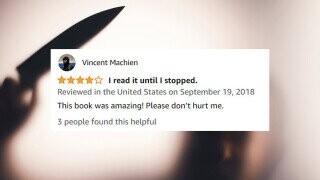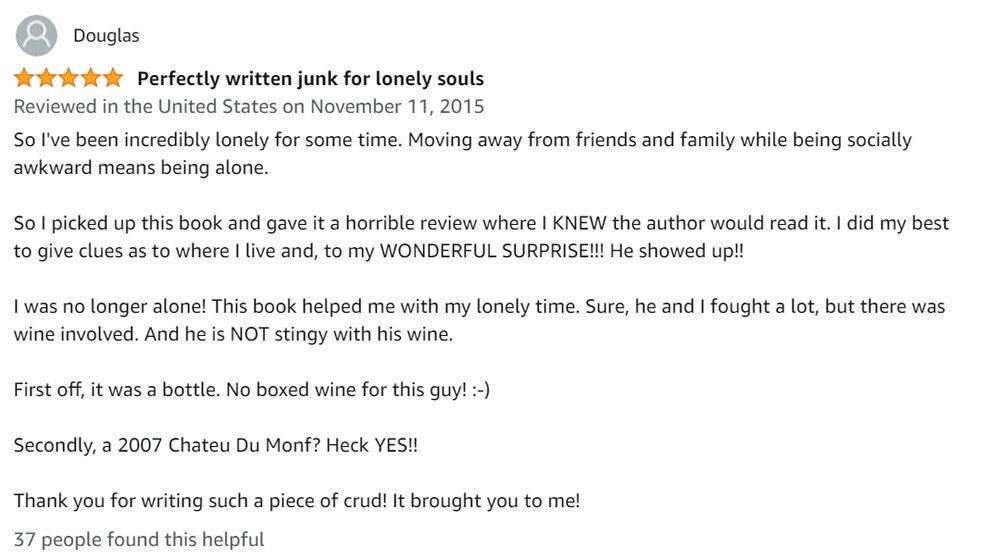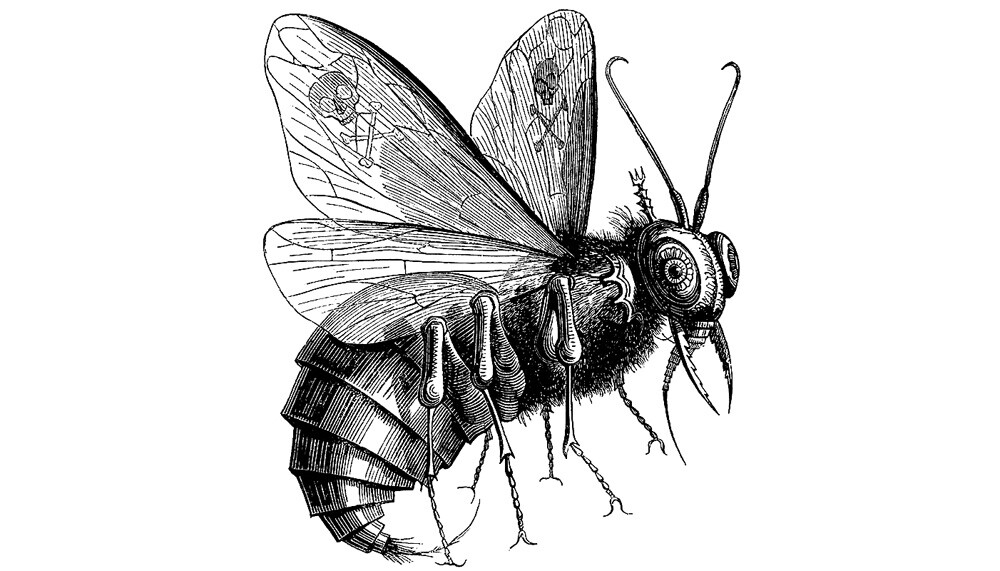5 Authors Who Took Things Too Far

Authors are strange figures, constantly having sex in graveyards, getting fooled by fairies and engaging in other such activities that remind us they’re all doomed to madness. You wish they’d pump all their disruptive energy solely into their writing career, so we can all reap the benefits of their eccentricity.
Sadly, though, when authors do exactly that, the results are even more disastrous — for themselves, and for the world.
One Guy Tracked Down a Negative Reviewer to Scotland and Attacked Her with a Wine Bottle
Richard Brittain’s literary career consists of half a dozen self-published books, none of them good. His main claim to fame is winning the British game show Countdown one time, which made him just well-known enough that people might have been interested to read what he had to write. In 2015, he uploaded an excerpt from his novel The World Rose to Wattpad, a site you might know best for fan fiction. One Wattpad user, Paige Rolland, left feedback, critiquing the writing.
Don't Miss
This would not do. Brittain decided she needed to be punished.
He looked her up and discovered she worked at a supermarket 400 miles away. So, he traveled there, spotted her, picked a wine bottle off a rack and slammed it on her head. This knocked her out and sent her to the hospital. Rolland was 18 at the time, by the way. Any random person you get angry with on the internet might be a teen or even younger — though, her age came as no surprise to Brittain, who’d already thoroughly checked out her Facebook profile.
Brittain received a 30-month prison sentence. Today, you can find his books on Amazon, where they receive poor reviews from readers he’s unable to hunt down and the occasional good review left as a joke. For example, you have this four-star review:

This more elaborate review came shortly before the court handed down its sentence:

A Fictional Demon Writer Grew to Believe in the Demons
He who fights with monsters should look to it that he himself does not become a monster. But also, he who writes of monsters should look to it that he himself does not believe in monsters.
Such was the lesson facing Jacques Collin de Plancy, a writer in 19th-century France. De Plancy wrote about demons, in a series of books that culminated in 1818’s Dictionnaire Infernal. He didn’t believe in demons himself. He documented them as items from folklore. De Plancy was an atheist, and the book said that even if you do believe in God, you shouldn’t believe in the contents of this bestiary since only God knows what goes on in the afterlife. Theologians who claim such knowledge have no idea what they’re talking about.
He therefore didn’t ask you to believe in the Adramelech, great chancellor of the underworld, part mule and part peacock:

Louis Le Breton
Nor did he expect you to believe in King Bael, who commands 66 legions and can turn people invisible.

And if you’ve ever heard Belzebub described as lord of the flies, de Plancy would never ask you to believe in a literal demon that looks like a giant fly.

And yet, after writing this book and revising it in the years that followed, de Plancy became captivated by his demons and decided there had to be some truth in them after all. He joined the Catholic church, edited his book to properly adhere to Catholic theology, and now declared the Dictionnaire Infernal to be a compendium of real beings rather than mythology.
Now, it’s possible that de Plancy lied to the world about his changed beliefs. The man was never exactly a straight shooter — he was born “Jacques Collin” then invented the new surname “de Plancy” himself, to sound more fancy. But if he did fake-convert to Catholicism to make his book sound realer to a new market, that would still earn him a spot on this list. It would also earn him a spot in Atheist Hell (a special hell created by atheists, where dead atheists go if they weren’t sufficiently dogmatic about atheism).
A Hitchhiking Author Faked Being Shot
Authors with books on the way are entirely capable of lying about their personal lives. Consider the case of Ray Dolin. In 2012, Dolin set out on a quest to document random acts of kindness in America, in a book of photography that he’d cryptically title Kindness in America. It started (claimed Dolin) when he found himself the one person to hand money to a veteran outside a West Virginia Walmart. He then embarked on a hitchhiking adventure, often receiving help from strangers, including (again, according to Dolin) from one man who literally offered him the shirt off his back.

In June, he experienced another act of kindness when a passing driver came to his aid. Unfortunately, the aid was only necessary because Dolin had been shot, and being shot isn’t much of an act of kindness at all.
Some random guy in a maroon pickup had earlier rolled down his window and shot him in the shoulder, said Dolin. You might say this disproves the thesis of his book, or you might say this misfortune means it’s more necessary than ever that we celebrate what little kindness exists by preordering the book right now. Police identified a pickup truck in the area and arrested the driver. But the evidence didn’t add up, and under interrogation, Dolin now admitted he’d lied. He’d really shot himself.
Dolin was bipolar and had tried to kill himself during a depressive episode, he now said. He’d messed that up and fired into his armpit instead of the heart (Dolin, too, wasn't exactly a straight shooter). The misadventure led to the police confiscating the memory card on which he’d recorded various acts of kindness that he swore he had not made up, and he wound up pleading guilty to a couple misdemeanors and having to pay thousands of dollars. Still, at least this wasn’t some case of an author promoting their book by successfully killing themselves, right?
One Author Promoted Her Book by Killing Herself
Edith Allonby wrote two sci-fi books set on an alien planet. Unfortunately, she wrote them in the very first years of the 20th century, and despite the valiant contributions of H.G. Wells, the public was not yet hungry for books set on alien planets. The books didn’t receive much attention, and when she wrote a follow-up, editors had a whole lot of notes for her. She turned to a surefire method of avoiding having to deal with rewrites: drinking carbolic acid and dying.
“When I am once out of the way, the big stumbling-block has been removed,” she wrote in a final note. “People can no longer think I have written with a fanciful irreverence.” Indeed, the editors did end up publishing her third novel. Still, we have to say that this publicity move severely limited all future output from her. If this 29-year-old instead stuck around and went on writing, she would have found a world much more receptive to her genre a couple decades down the line. Also, she would have spent those additional decades being alive, which comes with all sorts of fringe benefits.

San Francisco Examiner
In her final message, Allonby was quite keen to clarify that she was sane, a claim reviewers later would doubt. “If they say I'm mad,” she wrote, “tell them from me it's a madness that will spread — not the suicide but the belief. But indeed it is no madness.” We aren’t totally sure what that means, but we think she might have just cursed us all.
A Nobel Winner Gave A Totally Silent Interview
Enough about authors chasing publicity. Let’s reflect for a second on one who hated publicity.
The 1969 Nobel Prize in Literature went to Irish writer Samuel Beckett. It didn’t recognize any single piece of his (Nobel Prizes in Literature rarely do) but rather his entire body of work. His wife called the award “a catastrophe,” which was both the name of one of his plays and a declaration of how much they hated the new attention.
The Becketts had no desire to reap the rewards of fame. Samuel declined the chance to give a Nobel lecture, and he gave away the prize money. He turned down offers for interviews. Finally, requests from Swedish television became too much to ignore, and he accepted one invitation. A reporter could come to his hotel and interview him. One catch, though: The interviewer could not ask any questions. Also, Beckett would not volunteer any comments of his own, unprompted. Thus we got the following interview, which consists of Samuel Beckett staring at the camera in total silence.
Oh no, we’ve been cursed again. Only Adramelech can save us now.
Follow Ryan Menezes on Twitter for more stuff no one should see.